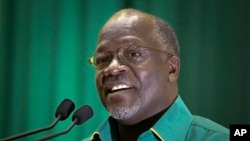Zimbabwe’s ruling Zanu PF party has gathered more than 600 people for its annual conference in the resort town of Victoria Falls at a cost of more than $3 million.
Insiders allege that most of the money to fund the shindig came from struggling parastatals and private companies that for years have been forced to fund the party’s activities.
But some analysts argue that this is a waste of money, asking the now famous question: What would Magufuli do?
John Pombe Magufuli was recently elected as the President of Tanzania and has been taking serious measures to curb inefficiency in his government, tax evasion and other malpractices in public offices.
Magufuli, some analysts opin, would have cancelled the conference as it does not resolve internal issues in Zanu PF or the country’s worsening economic crisis.
Zimbabweans, they said, are crying out for a Magufuli type of leader, a fiscal hawk who wants to change the lives of the ordinary people for the better.
The Bulldozer, as he is popularly called, promised to tackle corruption in his campaign and has lived up to expectation, pursuing a program of austerity since coming to power.
Magufuli, the son of a peasant farmer, shocked many in his country when he scrapped Independence Day celebrations saying it would be “shameful” when people are dying of cholera.
He was recently joined by former President Jakaya Kikwete, who stepped down after describing the job as “stressful and thankless”, in a clean-up of the city of Dar es Salaam.
Magufuli rode a bicycle to State House after the clean-up. Analysts say the talk in public places in Zimbabwe is being dominated by Magafuli's actions, adding they want the Zanu PF government to borrow a leaf from his book.
Political analysts in Zimbabwe are agreed nothing tangible may come out of the Zanu PF conference.
Tension and growing divisions in Zanu PF, they argue, are due to the failure by the ruling party to address President Robert Mugabe’s succession.
International Crisis Group director Pius Pigou says as long as the party skirts the succession issue, friction will continue.
“The factional issues that the 2014 congress were meant to try and resolve have actually opened the lid on further fights that we have seen unfolding in the course of 2015,” said Pigou.
“Essentially at the heart of the factional fights is the issue of succession. Different interests are positioning themselves. The fault lines are not as straight forward and not as solid as some may think.”
But party spokesman Simon Khaya Moyo says the party is addressing the economic crisis and this is top on the agenda.
“Our focus is on economic recovery, our focus is on ZimAsset which as you know has four major clusters of food security, social services and poverty eradication, infrastructure and utilities and value addition and beneficiation of our natural resources. So that's what we are going to be spending time on; issues that improve the people's quality of life,” Moyo said.
War veterans associations in Mashonaland East, Bulawayo and Matabeleland provinces have thrown spanners into ambitions by First Lady Grace Mugabe to deputize her husband declaring that vice president Emmerson Mnangagwa must stay put and his co-deputy Phelekezela Mphoko, an ally of Mrs. Mugabe’s and the so called G40, should pave way for a woman.
The war veterans, clearly backing Mnangagwa, also demanded that the party's political commissar Saviour Kasukuwere be replaced by a war veteran as he lacks the experience to mobilize supporters and unite them.
But the rival so-called Generation 40 has hit back pushing for Mrs. Mugabe to be elevated to the position of vice president and that War Veterans Minister Chris Mutsvangwa, an ally of Mnangangwa’s, be expelled.
The G40 group with the majority in the party’s National Disciplinary Committee has managed to suspend or expel a number of party officials backing Mnangangwa.
Former Zanu PF spokesman and spokesperson of the People First Movement, (fronted by former vice president Joice Mujuru) Rugare Gumbo, says the ruling party is now in tatters.
“I really don’t think that there’s much to comment about because the party is dead, it’s fractured, there’s no cohesion, there’s no unity,” Gumbo said.
But speaking from Victoria Falls, the resort toewn hosting the Zanu-PF conference, former war veterans’ leader Joseph Chinotimba denied the allegation that factionalism is tearing the party apart.
Chinotimba said the party remains strong and blamed the media for creating fictional fights.
But political analyst Gladys Hlatywayo says the friction in the party is now affecting the country in general.
“We know that the conference is not elective but we understand that the women’s league was mobilizing to have the conference to make a decision to say let’s go back to the women’s quota,” she said.
“So much is happening in Zanu PF that the lives of the ordinary people continue to be affected.”
Another political analyst Sydney Chisi concurs with Hlatywayo.
“I think the Zanu PF conference is a typically well-choreographed space where people are meeting just so that there’s assumed unity in the party but we know that deep down that people are more interested in how they get out of the doldrums of poverty and exclusion in the broader Zimbabwean situation,” he said.
The crisis in the ruling Zanu PF party is only deepening with Mr. Mugabe’s stunning accusation that the army, police and central intelligence officials are taking sides in the facttional fights in his party.
Last year, the International Crisis Group (ICG) warned that mounting tensions in Zanu PF over President Mugabe’s succession, First Lady Grace Mugabe’s entrance into mainstream politics, the dire economic crisis and related issues could see Zimbabwe sliding into a failed state.
In its report titled ‘Zimbabwe: Waiting for the Future', the ICG said Zimbabwe’s politics and economy are precarious, raising the need for Zanu PF to address the question of President Mugabe’s succession.






